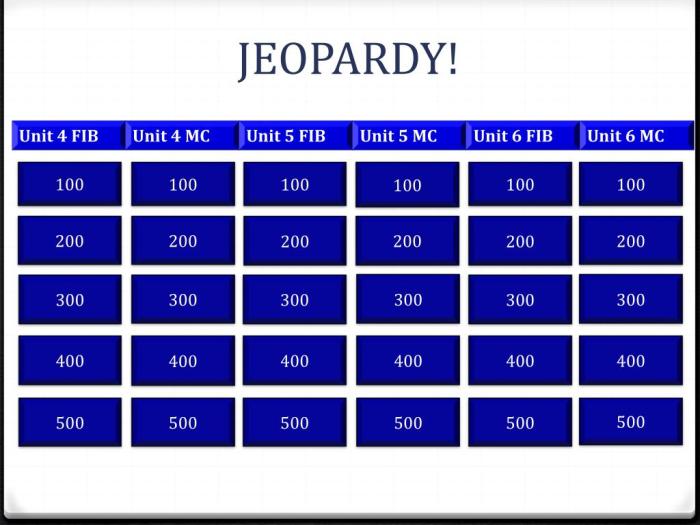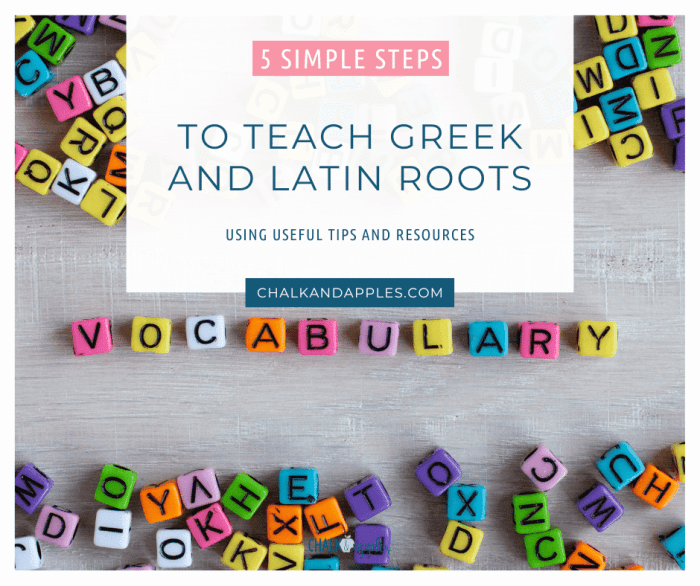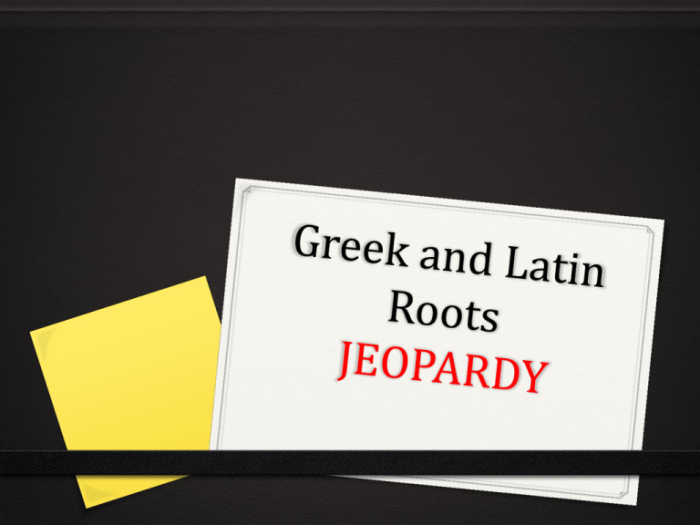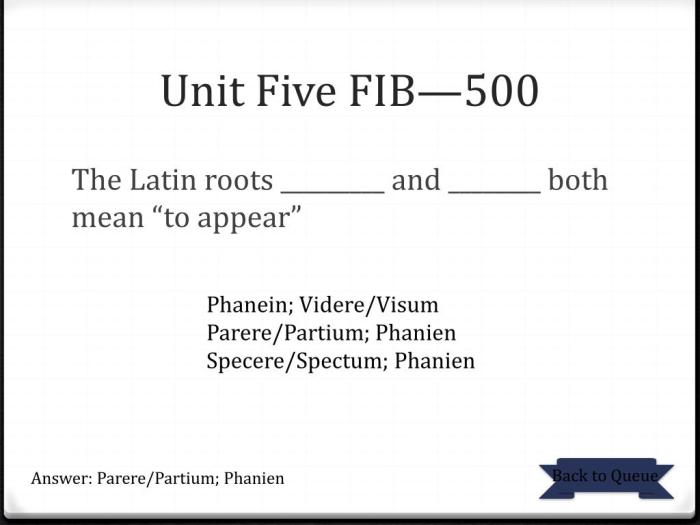Embark on an enthralling journey with the Greek and Latin Roots Jeopardy Game, an educational escapade that unveils the captivating world of classical languages. This interactive game not only challenges your knowledge but also enriches your understanding of the very foundations of the English language.
Immerse yourself in the dynamic gameplay, where contestants engage in a battle of wits, answering questions that delve into the etymological origins of words. Witness the remarkable educational value of this game as it reinforces vocabulary, enhances comprehension, and ignites a passion for language exploration.
Game Overview

Jeopardy! is a classic television game show where contestants compete to answer questions in a variety of categories.
The game is played on a board with six categories, each with five clues. The clues are arranged in order of difficulty, with the easiest clue at the top and the hardest clue at the bottom.
To answer a clue, a contestant must wager a certain amount of money. If they answer correctly, they win the amount they wagered. If they answer incorrectly, they lose the amount they wagered.
The game continues until one contestant has won all the money.
Categories Related to Greek and Latin Roots
Jeopardy! often includes categories related to Greek and Latin roots. These categories can help contestants improve their vocabulary and understanding of the English language.
Some examples of Greek and Latin roots categories include:
- Greek Roots
- Latin Roots
- Etymology
- Word Origins
- Language History
Gameplay Mechanics

The gameplay of Greek and Latin Roots Jeopardy! revolves around contestants answering questions related to Greek and Latin roots. These roots are the building blocks of many English words, and understanding them can greatly enhance vocabulary and comprehension.
The game is played in a standard Jeopardy! format, with three contestants competing against each other. The game board is divided into six categories, each with five clues of varying difficulty. The clues are presented in the form of questions or statements, and the contestants must provide the correct answer.
Point System
Each correct answer earns the contestant a certain number of points, depending on the difficulty of the clue. The point values are as follows:
- 100 points for an easy clue
- 200 points for a medium clue
- 300 points for a hard clue
Incorrect answers result in the contestant losing the same number of points that they would have earned for a correct answer.
Types of Questions
The clues in Greek and Latin Roots Jeopardy! cover a wide range of topics, including:
- The meaning and origin of Greek and Latin roots
- The use of roots in English words
- The etymology of words
- The history of the Greek and Latin languages
The difficulty of the clues varies depending on the topic and the level of knowledge required to answer them.
Educational Value: Greek And Latin Roots Jeopardy Game

The Jeopardy game is a valuable educational tool for learning Greek and Latin roots. It reinforces vocabulary and improves comprehension by providing an engaging and interactive way to practice.
The game format challenges players to recall and apply their knowledge of roots, prefixes, and suffixes. By answering questions correctly, players earn points and reinforce their understanding of these essential building blocks of language.
Benefits for Learning Greek and Latin Roots
- Reinforces Vocabulary:The game requires players to actively recall and use root words, prefixes, and suffixes. This repetition strengthens their memory and helps them to retain these vocabulary elements.
- Improves Comprehension:By understanding the roots of words, players can better understand the meaning and derivation of new words they encounter. This improved comprehension extends to both reading and writing.
- Develops Critical Thinking:The game encourages players to think critically about the relationships between words and their meanings. They must analyze clues and apply their knowledge to solve problems.
Examples of Educational Use
The Jeopardy game can be used in educational settings in various ways:
- As a review activity:After introducing a set of roots, prefixes, or suffixes, teachers can use the game to review and reinforce students’ understanding.
- As a formative assessment:The game can provide teachers with insights into students’ progress and areas where they may need additional support.
- As a homework assignment:Students can play the game independently to practice and consolidate their learning outside of class.
Cultural Significance

The roots of the English language lie deep in the ancient languages of Greece and Latin. These roots have shaped the very fabric of our language, influencing its vocabulary, grammar, and even its pronunciation.
Historical Context
The influence of Greek and Latin on English began with the Norman Conquest in 1066. The Norman conquerors brought with them a new language, French, which was heavily influenced by Latin. Over time, French words and phrases began to seep into English, bringing with them their Greek and Latin roots.
Influence on the English Language
The influence of Greek and Latin roots on English is evident in a wide range of words and phrases. For example, the word “democracy” comes from the Greek words “demos” (people) and “kratos” (power), while the word “republic” comes from the Latin words “res” (thing) and “publica” (public).
Even common words like “school” and “table” have Greek and Latin roots.
Examples of Influence
- Democracy (Greek: demos = people, kratos = power)
- Republic (Latin: res = thing, publica = public)
- School (Greek: skhole = leisure, study)
- Table (Latin: tabula = board)
- Geography (Greek: geo = earth, graphein = to write)
- Biology (Greek: bios = life, logos = study)
- Psychology (Greek: psyche = soul, logos = study)
Game Design
The Jeopardy! game has evolved into several versions over the years, each targeting specific audiences and offering unique gameplay experiences.
The following table provides an overview of different Jeopardy! game versions:
Game Versions
| Game Name | Target Audience | Number of Players | Unique Features |
|---|---|---|---|
| Jeopardy! (Original) | General audience | 3 | Classic gameplay, iconic host, wide range of categories |
| Jeopardy! Kids | Children ages 10-14 | 3 | Simplified clues, shorter game duration, age-appropriate topics |
| Jeopardy! College Championship | College students | 15 (3 per school) | Academic focus, specialized categories, tournament format |
| Celebrity Jeopardy! | Famous personalities | 3 | Celebrity contestants, charitable donations, guest hosts |
Strategies for Success

Excelling at Greek and Latin Roots Jeopardy requires strategic planning and preparation. Successful players employ effective study techniques, understand question patterns, and develop quick and accurate answering skills.
Effective Study and Preparation
Thorough preparation is crucial. Begin by familiarizing yourself with the game’s format and question types. Utilize flashcards, root word lists, and practice questions to reinforce knowledge.
Answering Questions Quickly and Accurately
Speed and accuracy are essential. Develop a system for quickly recognizing root words and their meanings. Practice answering questions aloud to improve fluency and accuracy.
Understanding Question Patterns, Greek and latin roots jeopardy game
Analyze previous game questions to identify common patterns and themes. Study root words and their derivatives to anticipate potential questions.
Additional Tips
- Attend practice sessions to gain experience and receive feedback.
- Join study groups to collaborate and share knowledge.
- Use online resources and apps to supplement your learning.
- Stay focused and manage your time effectively during the game.
Variations and Adaptations
Jeopardy games with a focus on Greek and Latin roots offer diverse variations that cater to various learning styles and preferences.
For younger learners or those with limited vocabulary, simplified versions of the game can be created using common Greek and Latin roots. These variations often incorporate visual aids and interactive elements to enhance engagement.
Age-Appropriate Adaptations
- Elementary School:Games focus on basic roots and use colorful graphics and animations.
- Middle School:Games include more complex roots and introduce strategies for root identification.
- High School:Games delve into advanced roots and explore their usage in various contexts.
Additionally, the game can be adapted to accommodate different skill levels. For struggling students, games can provide hints or allow for collaboration. For advanced students, games can incorporate more challenging roots and require independent problem-solving.
Common Queries
What is the primary objective of the Greek and Latin Roots Jeopardy Game?
To enhance vocabulary and comprehension by exploring the etymological origins of words.
How does the game reinforce vocabulary?
By presenting questions that require contestants to recognize and understand the meaning of words derived from Greek and Latin roots.
What are some strategies for success in the game?
Effective study, preparation, and quick, accurate answering techniques.